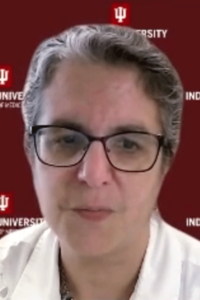The annual ADA Diabetes Care Symposium always focuses on key issues from the previous year, so there was little doubt that this year’s session would focus on COVID-19.
Learning to Minimize Risks for People with Diabetes in the COVID-19 Pandemic took place Saturday morning, June 26, and can be viewed by registered meeting attendees at ADA2021.org through September 29, 2021. If you haven’t registered for the Virtual 81st Scientific Sessions, register today to access all of the valuable meeting content.

Edward W. Gregg, PhD, Professor and Chair of Diabetes and Cardiovascular Epidemiology, School of Public Health, Imperial College, London, United Kingdom, opened the symposium by addressing the link between diabetes and COVID-19 morbidity and mortality, the role of diabetes in influencing COVID-19 risk, and the pandemic’s impact on diabetes patients.
Epidemiological studies indicate that diabetes is a central contributor to severe COVID-19 morbidity, Dr. Gregg noted. People with diabetes account for 30% to 40% of hospitalized COVID-19 patients, with between 21% and 43% of this group requiring intensive care, he added.
While Dr. Gregg said it was encouraging to see so much epidemiological data come out of the pandemic in a short period of time, he said the information so far is narrow and inadequate. For example, 90% of COVID-19 epidemiological data involves hospital components.
“We need a broader view of the epidemiology,” he said. “We need population denominators to understand the full cascade of risk. We need a full range of indirect effects of the pandemic to understand factors in care, management, and behavior that were most dramatically affected. And we need to understand the unintended benefits that may have occurred from the rapid innovation of care.”

Linda DiMeglio, MD, MPH, Professor of Pediatrics, Division of Pediatric Endocrinology and Diabetology, Indiana University School of Medicine, noted that type 1 diabetes patients are not more susceptible to COVID-19 infection than other individuals, but they are at increased risk. The risk for severe illness, hospitalization, and in-hospital mortality is similar to those with type 2 diabetes, she said.
Looking to the future, Dr. DiMeglio recommended collecting longitudinal, retrievable public data that will further differentiate type 1 and type 2 diabetes, and contextualize data to inform child care, the return to school, and extracurricular decisions. Dr. DiMeglio also emphasized the need for multidisciplinary care for diabetes patients.
“In addition to doing these things, we need to work on getting better guidelines for care delivery using remote technology, including optimal clinic flow and staffing models,” she said. “We need to work with insurers to provide durable insurance coverage for alternative care models, and to ensure that we can use outcomes not necessarily used before. This could be time-in-range versus A1C. We also need to support virtual education and work platforms, and other ways to provide people with medical, nutritional, and mental health care.”
At the conclusion of the session, Symposium Chair Matthew C. Riddle, MD, Oregon Health & Science University, presented two Diabetes Care Profiles in Progress awards, which recognize people whose discoveries or contributions in the field of diabetes have changed the landscape of diabetes management. This year’s recipients are:
- Mladen Vranic, MD, DSc, FRCP(C), who advanced the understanding of diabetes physiology through work in glucose metabolism, exercise, stress, and hypoglycemia
- Guenther Boden, MD, a pioneer in human studies of nutrition and obesity, and the mystery of insulin resistance for handling glucose
VIEW THIS PRESENTATION
Already registered?
View this presentation at ADA2021.org
Not yet registered?
Register now to access all presentations from the Virtual 81st Scientific Sessions